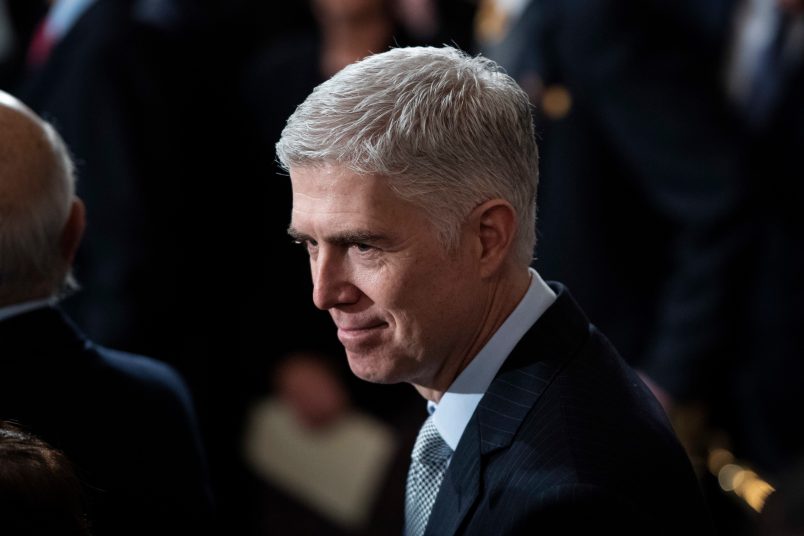Justice Neil Gorsuch can’t wait to let states exclude noncitizens from redistricting.
Multiple times during Tuesday’s hearing on the Trump administration’s move to add a citizenship question to the census, Gorsuch returned to vague allusions to an unsuccessful 2016 Supreme Court case that dealt with that possibility.
Gorsuch’s lines of inquiry didn’t get too much traction at Tuesday’s arguments, which mostly focused on the technical considerations of Secretary Wilbur Ross’ decision to include the question. But, in a way, they were appropriate, given that overhauling how legislative districts are drawn — a massive voting rights change that would diminish the political power of urban and diverse communities — appears to be the endgame of the current push to add the question.
Through his questioning, Gorsuch hinted that he was sympathetic to the arguments made in this case by conservative advocates who have signaled they will seek exclude noncitizens from redistricting if the citizenship question remains on the census.
The last case that tried to do this was Evenwel v. Abbott. The challengers argued that states should be prohibited from drawing state legislative districts on the basis of total population — as is currently near-universally done — and draw them on some citizenship-based metric instead.
An argument defending the use of total population made in an amicus brief asserted that there isn’t currently citizenship data provided by the Census that is accurate enough for redistricting.
While the previous short form census surveys — which go out to every household in the country — have provided total population numbers that are used for redistricting, a rolling survey known as American Community Survey (ACS), which is sent of a smaller segment of the population, is used to extrapolate estimates for number of citizens.
Gorsuch was not yet on the court when Evenwel was unanimously decided in favor of letting states continue to use total population for redistricting. But his conservative allies, Justice Clarence Thomas and Justice Samuel Alito, in their respective concurrences, said that that states should be able to use whatever metric they’d like and said a separate case should decide this question on whether states have that latitude.
If the citizenship question is allowed to stay on the census — and the conduct of conservative justices Tuesday suggests it will be — a case establishing whether the data could be used to cut noncitizens from the redistricting count would only be a matter of time.
In fact, the organization that spearheaded the Evenwel case filed a friend-of-the-court brief that made plain that the question should stay on the census so states and localities could explore drawing districts based only on citizens.
Gorsuch did not invoke Evenwel by name, but his question echoed language used in the friend-of-the-court brief by the Project on Fair Representation, which brought the Evenwel challenge. The Project on Fair Representation is led by conservative advocate Ed Blum, who was also behind the Supreme Court case that gutted the Voting Rights Act.
Here’s a portion of the group’s brief on the current census case:

Here’s how Gorsuch phrased his question, which was for New York Solicitor General Barbara Underwood, one of the lawyers representing those challenging the question:
“As I understand it, some of the respondents and other people in litigation have complained when — when folks have relied on the ACS to extrapolate citizenship for purposes of redistricting and, in fact, argued that we should rely only on actual census data? And I understand respondents have made that argument in litigation. So what do we do with that?”
Underwood pointed out that whatever complaints exist of ACS, the Census Bureau had presented Ross a proposal, before his official decision to add the question, to provide the citizenship data that would be more accurate than the ACS and more accurate even than asking that question directly on the short form census. That proposal would have the Census Bureau link various records from other agencies on citizenship with its own citizenship data.
Gorsuch, nonetheless, returned to the question again, when grilling Dale Ho, an ACLU lawyer representing the non-profits challenging the question.
“Some of the states who are now respondents before us have in litigation, including in this Court, argued that ACS data should not be relied upon for purposes of citizenship or other purposes, that the census data is more accurate,” Gorsuch said. “What do we do about that? It seems to me like you kind of put the government in a bit of a Catch 22. You say they shouldn’t use the census, except for in later litigation when they have to use the census.”
Judging by Gorsuch’s rhetoric Tuesday, conservative advocates like Blum could walk away from the hearing not only confident that the citizenship question should stay on the census, but that Gorsuch, Thomas and possibly Alito were in their camp for using it to exclude noncitizens from redistricting.






